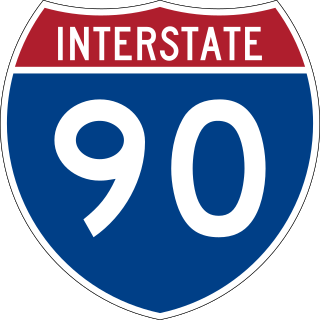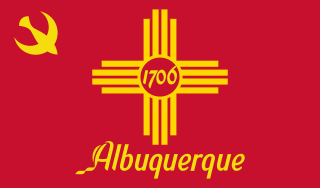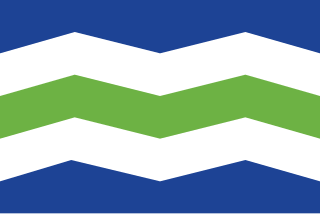
Spokane County is a county located in the U.S. state of Washington. As of the 2020 census, its population was 539,339, making it the fourth-most populous county in Washington. The largest city and county seat is Spokane, the second largest city in the state after Seattle. The county is named after the Spokane people.

The flag of Salt Lake City, Utah consists of two horizontal bars of blue and white with a sego lily in the canton. It was adopted in 2020 after a city-wide contest to replace a previous flag.

The flag of Indianapolis has a dark blue field with a white five-pointed star pointing upwards in the center. Around the star is a circular field in red. Surrounding the red field is a white ring, from which extend four white stripes from top to bottom and from hoist to fly, thus creating four equal quadrants in the field. The stripes are about one-seventh the width of the flag, with the white ring the same width as the stripes. The diameter of the red circle is about two-ninths the width of the flag.
The Spokesman-Review is a daily broadsheet newspaper based in Spokane, Washington, the city's sole remaining daily publication. It has the third-highest readership among daily newspapers in the state, with most of its readership base in eastern Washington and northern Idaho.

Joe Albi Stadium was an outdoor multi-purpose stadium in Spokane, Washington, United States. It was located in the northwest part of the city, just east of the Spokane River. The stadium was primarily used for high school football, as a secondary home field for the Washington State Cougars, and for minor league soccer.

Interstate 90 (I-90), designated as the American Veterans Memorial Highway, is a transcontinental Interstate Highway that runs from Seattle, Washington, to Boston, Massachusetts. It crosses Washington state from west to east, traveling 298 miles (480 km) from Seattle across the Cascade Mountains and into Eastern Washington, reaching the Idaho state line east of Spokane. I-90 intersects several of the state's other major highways, including I-5 in Seattle, I-82 and U.S. Route 97 (US 97) near Ellensburg, and US 395 and US 2 in Spokane.

The Spokane Daily Chronicle is a daily digital newspaper in Spokane, Washington. It was founded as a weekly paper in 1881 and grew into an afternoon daily, competing with The Spokesman-Review, which was formed from the merger of two competing papers.

Calvin Bruce Anderson was an American military officer and politician who served as a member of the Washington State Senate, representing the 43rd district in 1995. A member of the Democratic Party, he previously served as a member of the Washington House of Representatives from 1987 to 1995, and was the first openly gay member of the Washington State Legislature.

The current flag of Billings, Montana is a triband of dark blue and white with the city seal on the central white panel. The seal shows the city skyline line-drawn in blue, with a red disc representing the sun. The seal is outlined in blue with the text "Star of the Big Sky Country" in red capitals. It was designed by Fernando Méndez and adopted in June 1986.
The 1914 Montana football team represented the University of Montana in the 1914 college football season. They were led by second-year head coach A. George Heilman, played their home games at Dornblaser Field and finished the season with a record of seven wins, zero losses and one tie (7–0–1).

Richard M. Bond was an American politician who served in the Washington House of Representatives from the 6th district as a member of the Republican Party.
John "Johnnie" Bevan is an American former competitive figure skater. He finished in the top six at two World Junior Championships.
The 1922 Gonzaga Bulldogs football team was an American football team that represented Gonzaga University during the 1922 college football season. In their third year under head coach Gus Dorais, the Bulldogs compiled a 5–3 record and outscored their opponents 214 to 79.

The 1965 Washington State Cougars football team was an American football team that represented Washington State University in the Athletic Association of Western Universities (AAWU) during the 1965 NCAA University Division football season. In their second season under head coach Bert Clark, the Cougars compiled a 7–3 record, and outscored their opponents 139 to 103.

The 1968 Washington State Cougars football team was an American football team that represented Washington State University in the Pacific-8 Conference (Pac-8) during the 1968 NCAA University Division football season. In their first season under head coach Jim Sweeney, the Cougars compiled a 3–6–1 record, and outscored their opponents 189 to 188. The final two games were shutout victories.
The 1976 Montana State Bobcats football team represented the Montana State University in the 1976 NCAA Division II football season. The team was led by sixth-year head coach Sonny Holland and won the Division II national championship. The Bobcats played their home games on campus in Bozeman at Reno H. Sales Stadium.

The municipal flag of Provo, Utah, United States, features the city's logo on a light blue field. It was adopted on January 6, 2015, after a multi-year debate to replace the previous one. The former flag, adopted in 1989, was ridiculed in particular for its perceived ugliness and its similarity to the Centrum logo, and was voted one of the worst American city flags by the North American Vexillological Association (NAVA).
The 1920 Idaho Vandals football team represented the University of Idaho in the 1920 college football season. Idaho was led by first-year head coach Thomas Kelley in their penultimate season as an independent before joining the Pacific Coast Conference in 1922. The Vandals had one home game in Moscow on campus at MacLean Field, with one in Boise at the state fairgrounds.

The flag of Albuquerque is the official municipal flag of the city of Albuquerque, New Mexico. The design is a red field with yellow elements.

The flag of Burlington, Vermont was adopted by the Burlington city council on November 27, 2017 during the mayorship of Miro Weinberger. It is five horizontal, zig-zag stripes of blue, white, green, white, and blue.
















